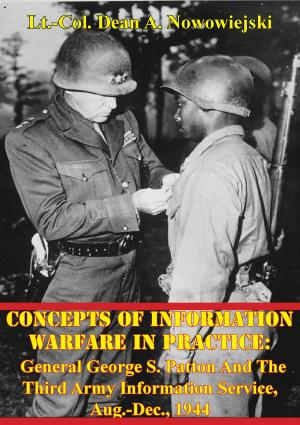Operation Rösselprung And The Elimination Of Tito, 25 May 1944: A Failure In Planning And Intelligence Support
Nonfiction, History, Germany, European General, Military, United States| Author: | Lieutenant-Colonel Wayne D. Eyre | ISBN: | 9781782897958 |
| Publisher: | Lucknow Books | Publication: | August 15, 2014 |
| Imprint: | Lucknow Books | Language: | English |
| Author: | Lieutenant-Colonel Wayne D. Eyre |
| ISBN: | 9781782897958 |
| Publisher: | Lucknow Books |
| Publication: | August 15, 2014 |
| Imprint: | Lucknow Books |
| Language: | English |
Operation RÖSSELPRUNG was a Second World War German operation conducted in Bosnia, which aimed at eliminating the leadership of the Partisan movement, namely Marshal Josip-Broz Tito. It was a direct action raid, which involved an airborne (parachute and glider) assault by 500 SS Fallschirmjäger (Parachute) Battalion on the suspected site of Tito’s Headquarters and a subsequent linkup with the German XV Mountain Corps converging from all directions.
Operation RÖSSELPRUNG failed due to mediocre intelligence support and inadequate tactical level planning. Intelligence shortfalls were rooted primarily in poor German inter-organization relations and cooperation, including the sharing of intelligence, which resulted in missed opportunities and a failure to pinpoint Tito’s location with sufficient precision. Given the quality of intelligence provided, the plan for the airborne assault did not include sufficient flexibility for the execution of contingencies.
There are three major conclusions from the failure of this operation that can be applied to contemporary operations of a similar nature:
The first deals with tactics to be employed in the face of uncertain intelligence. The degree of intelligence certainty is critical in determining both the size of the force and the extent of the objective area in a direct action raid.
The second is the requirement for contingency planning. Contingency planning provides commanders with flexibility once an operation has commenced to deal with the unexpected, and is especially vital in the face of uncertain intelligence.
The third, and probably most critical, concerns the importance of interagency intelligence cooperation. It is vital that different intelligence organizations that are pursuing a similar goal, especially in the same theatre of operations, cooperate to the greatest extent possible.
Operation RÖSSELPRUNG was a Second World War German operation conducted in Bosnia, which aimed at eliminating the leadership of the Partisan movement, namely Marshal Josip-Broz Tito. It was a direct action raid, which involved an airborne (parachute and glider) assault by 500 SS Fallschirmjäger (Parachute) Battalion on the suspected site of Tito’s Headquarters and a subsequent linkup with the German XV Mountain Corps converging from all directions.
Operation RÖSSELPRUNG failed due to mediocre intelligence support and inadequate tactical level planning. Intelligence shortfalls were rooted primarily in poor German inter-organization relations and cooperation, including the sharing of intelligence, which resulted in missed opportunities and a failure to pinpoint Tito’s location with sufficient precision. Given the quality of intelligence provided, the plan for the airborne assault did not include sufficient flexibility for the execution of contingencies.
There are three major conclusions from the failure of this operation that can be applied to contemporary operations of a similar nature:
The first deals with tactics to be employed in the face of uncertain intelligence. The degree of intelligence certainty is critical in determining both the size of the force and the extent of the objective area in a direct action raid.
The second is the requirement for contingency planning. Contingency planning provides commanders with flexibility once an operation has commenced to deal with the unexpected, and is especially vital in the face of uncertain intelligence.
The third, and probably most critical, concerns the importance of interagency intelligence cooperation. It is vital that different intelligence organizations that are pursuing a similar goal, especially in the same theatre of operations, cooperate to the greatest extent possible.














![Cover of the book A Soldier’s Manuscript [Illustrated Edition] by Lieutenant-Colonel Wayne D. Eyre](https://www.kuoky.com/images/2014/august/300x300/9781782894810-I60d_300x.jpg)
![Cover of the book A War Nurse’s Diary; Sketches From A Belgian Field Hospital [Illustrated Edition] by Lieutenant-Colonel Wayne D. Eyre](https://www.kuoky.com/images/2014/june/300x300/9781782891635-QpIG_300x.jpg)